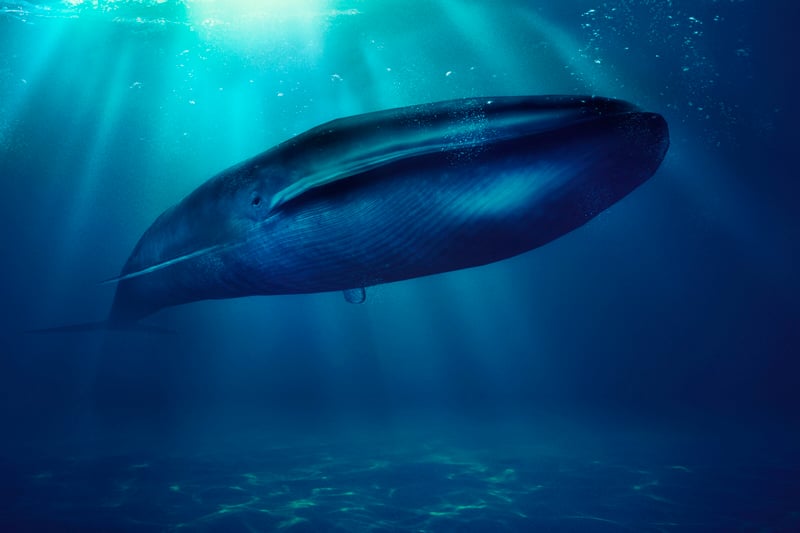
Blue whales are falling silent—and it’s a dire warning for our oceans. Climate change, factory farming, and industrial fishing are threatening marine life, and we need to take action to protect these ocean giants.
Blue whales are the largest animals to have ever lived on this planet. They sing songs that echo across hundreds of miles of ocean, but now, those songs are fading.
Off the coast of California, scientists have recorded a nearly 40% drop in blue whale vocalizations over just six years. These giants of the deep—beings who once filled the ocean with their low, haunting calls—are falling silent.
Their silence isn’t just heartbreaking. It’s a warning.
Why Aren’t Whales Singing?
The answer starts with a broken food chain.
Unrelenting marine heatwaves, fueled by the climate crisis, are starving blue whales. The once-abundant krill and anchovies they depend on are disappearing—victims of warming waters, toxic algal blooms, and ocean acidification. And when whales don’t have enough food, they stop singing.
As Dr. John Ryan, a biological oceanographer studying the ecology of plankton, fish, and mammals, explained, “It’s like trying to sing while you’re starving.”
But that’s only part of the problem.
Human noise is drowning out their world. Cargo ships, sonar, and drilling operations have filled the ocean with constant, unnatural sound. Blue whales rely on their songs to find mates, communicate across vast distances, and navigate their underwater world. When we flood their habitat with noise, we leave them disoriented, disconnected, and increasingly alone.
This Silence Isn’t Natural—It’s Manufactured
The silence of blue whales isn’t a mystery. It’s manufactured by industries that treat the ocean like a resource to be exploited.
Take factory farming, for example. Most people think of it as a land-based issue, but industrial animal agriculture is a major contributor to the climate crisis—and the warming of our oceans. It’s responsible for at least 14.5% of global greenhouse gas emissions. Methane from manure lagoons, nitrous oxide from fertilizer, and deforestation driven by growing animal feed all accelerate the heating of our planet. The result? Marine heatwaves that decimate the base of the ocean food web.
Factory farms also pollute our waterways. Runoff filled with waste, antibiotics, and fertilizer flows into rivers and eventually into the sea, fueling dead zones where few marine animals can survive.
Then there’s industrial fishing—another key player in the whales’ disappearing songs. Commercial fishing vessels don’t just strip the ocean of fish; they kill countless non-target (or bycatch) animals in the process. Blue whales, dolphins, and sea turtles are regularly entangled in discarded fishing lines and nets—often left to drown or suffer slow, painful deaths.
This isn’t by accident. It’s by design, and it’s entirely preventable.
What Happens When Whales Go Quiet?
Whale songs aren’t just beautiful. They’re essential.
Blue whales use their voices to locate each other, find mates, and maintain their cultural traditions. Each population has a unique dialect—a shared language passed down through generations. When those songs go quiet, it signals more than ecological collapse. It means cultural extinction.
When whales suffer, the ocean suffers. These animals play a critical role in regulating marine ecosystems. Even their waste feeds the phytoplankton that generate the oxygen we breathe and absorb carbon from the atmosphere. In short: the survival of whales isn’t just about them, it’s about all of us.
We Still Have a Choice
The silence of blue whales is a message. One we can’t afford to ignore.
To protect these incredible animals—and the oceans they call home—we must:
- End factory farming and invest in plant-based food systems that reduce emissions and pollution.
- Phase out industrial fishing and replace it with truly sustainable practices that prioritize animals and ocean health.
- Reduce ocean noise by slowing down ships, rerouting traffic, and banning sonar and seismic testing in critical marine habitats.
- Create and enforce marine protected areas that give whales—and their prey—a chance to recover.
- Push for real climate action that keeps warming below 1.5°C and holds polluting industries accountable.
Our Responsibility
Blue whales survived centuries of commercial whaling. But they might not survive the next few decades of silence.
At World Animal Protection US, we know that every animal has the right to a natural life without exploitation. That includes the right to sing. The right to thrive. The right to exist in a world not choked by noise, starved by greed, or poisoned by pollution.
When the ocean speaks—whether through waves, storms, or the absence of a whale’s call—we need to listen and then we need to act. Help us continue to fight for animals and create a kinder world for all. Donate today.